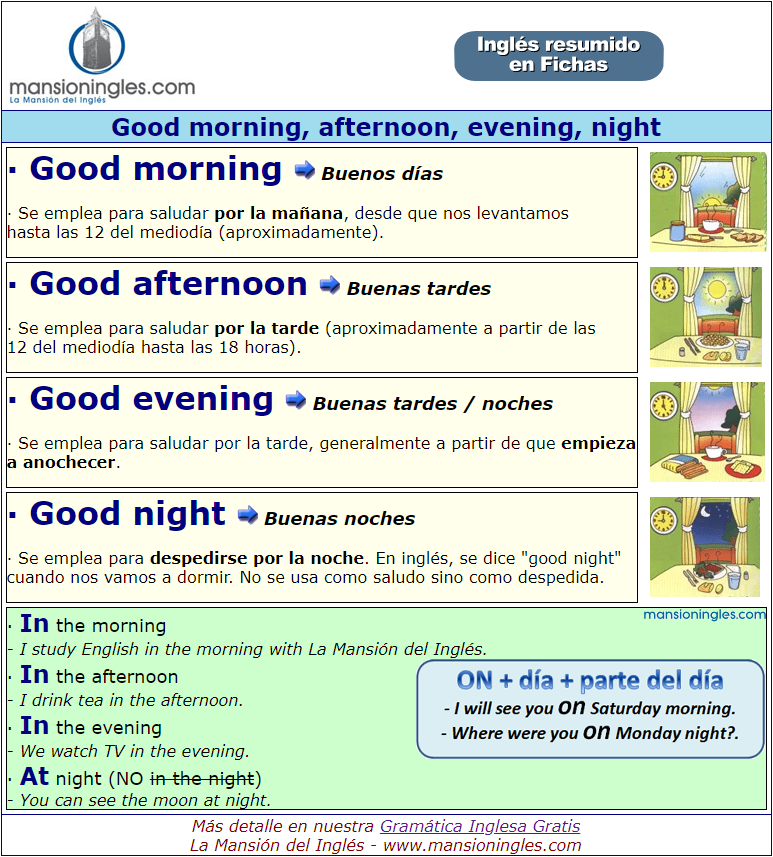Have you ever wondered how to properly say "buenas noches" in English? Well, buckle up because we’re diving deep into the world of nighttime greetings! Whether you're traveling, chatting with English-speaking friends, or just curious about language differences, this guide will give you all the tools you need to master saying good night like a pro. So grab your favorite drink, get comfy, and let's explore how to nail this phrase!
You might be thinking, "Why does something as simple as saying good night even matter?" Well, my friend, language is all about connection, and mastering greetings can make a big difference in how people perceive you. Saying good night in English isn’t just about the words—it’s about the tone, the context, and the cultural nuances that come with it. Stick around, and I’ll break it down for you step by step.
Before we dive into the nitty-gritty, let’s talk about why learning phrases like "good night" is so important. In today’s globalized world, being able to communicate effectively in different languages can open doors both personally and professionally. Plus, who doesn’t love impressing others with their language skills? Let’s make sure you’re ready to ace this greeting every single time!
Read also:Monotone Chef Critic The Unsung Heroes Of The Culinary World
Understanding the Basics: What Does "Good Night" Mean?
Alright, let’s start with the basics. When someone says "buenas noches" in Spanish, they’re essentially wishing you a peaceful night. In English, the equivalent phrase is "good night." Simple enough, right? But there’s more to it than just the words themselves. "Good night" is typically used when parting ways at the end of the day or when going to bed. It’s a polite and warm way to wrap up conversations or say farewell.
One thing to note is that "good night" isn’t interchangeable with other greetings like "goodbye" or "see you later." It’s specifically tied to nighttime, so using it during the day might raise a few eyebrows. Think of it as a gentle signal that it’s time to wind down and rest.
When to Use "Good Night" in English
Now that we’ve covered the basics, let’s talk about when to use "good night." Here are a few scenarios where this phrase comes in handy:
- When you’re saying goodbye to someone as you head to bed.
- When leaving a social gathering late at night.
- When ending a phone call or video chat late in the evening.
- When wishing someone a restful sleep before parting ways.
Remember, timing is key. If it’s still early in the day, you might want to opt for a different farewell like "see you later" or "take care." But once the sun goes down and the stars come out, "good night" becomes the perfect choice.
Common Variations of "Good Night"
Language is all about flexibility, and "good night" is no exception. There are several variations of this phrase that you can use depending on the situation. Here are a few examples:
- "Have a good night" – A friendly way to wish someone well as they go about their evening.
- "Sleep tight" – A casual and playful way to say good night, often used among friends or family.
- "Sweet dreams" – A warm and affectionate way to wish someone pleasant dreams.
- "Night, night" – A more informal version of good night, often used in casual settings or with close acquaintances.
These variations add flavor to your conversations and allow you to tailor your greetings to the audience and context. Whether you’re being formal or laid-back, there’s a version of "good night" that fits the occasion.
Read also:Is Han Quokka And Bbokari A Girl Unveiling The Truth About These Social Media Sensations
Regional Differences in Saying Good Night
Did you know that different regions in the English-speaking world might have their own unique twists on saying good night? For example, in the UK, you might hear "cheerio" or "nighty-night" as informal alternatives. In Australia, "see ya later" might be thrown in for good measure. These regional nuances highlight the diversity and richness of the English language.
So, if you’re traveling or interacting with people from different parts of the world, don’t be surprised if you encounter variations of "good night." Embrace the differences and enjoy the cultural exchange!
Tips for Pronouncing "Good Night" Correctly
Pronunciation can make or break how your greeting is received. To ensure you’re saying "good night" correctly, here are a few tips:
- Emphasize the "good" part slightly to convey warmth and sincerity.
- Make sure the "night" is pronounced clearly, with a soft "t" sound at the end.
- Practice saying it slowly at first, then gradually speed up as you become more comfortable.
- Pay attention to your tone—keep it friendly and relaxed.
Listening to native speakers or using language apps can also help you refine your pronunciation. The more you practice, the more natural it will feel.
Common Mistakes to Avoid
Let’s talk about some common mistakes people make when saying "good night." One of the biggest is mispronouncing the "t" in "night" as a hard "d" sound. Another is using "good night" inappropriately during the day. To avoid these pitfalls, remember to:
- Stick to nighttime contexts when using "good night."
- Practice your pronunciation regularly.
- Be mindful of the tone and context of your conversation.
By avoiding these mistakes, you’ll come across as confident and polished in your interactions.
The Cultural Significance of Saying Good Night
Language is deeply tied to culture, and saying "good night" is no exception. In many English-speaking countries, this phrase carries a sense of respect and care for the other person’s well-being. It’s a way of acknowledging the end of the day and wishing someone a peaceful rest.
Historically, saying good night was seen as a polite gesture among polite society. It was a way to maintain social harmony and show consideration for others. Even today, this tradition continues, though it’s adapted to modern contexts like texting or social media.
Etiquette Around Saying Good Night
When it comes to etiquette, there are a few unwritten rules to keep in mind:
- Make sure the other person is ready to end the conversation before saying good night.
- Use a warm and friendly tone to convey sincerity.
- Pair "good night" with a smile or a friendly gesture if you’re saying it in person.
Following these guidelines will help you navigate social situations with grace and confidence.
Practical Examples of Using "Good Night"
Let’s put theory into practice with some real-life examples:
- At a dinner party: "It’s been such a great evening. Good night, everyone!"
- On a phone call: "Alright, I’ll let you get some rest. Good night, and take care!"
- With a roommate: "I’m heading to bed now. Good night!"
- At work: "That’s all for today. Good night, team!"
These examples demonstrate how versatile "good night" can be in different settings. Whether you’re in a formal or casual environment, this phrase is always appropriate.
How to Respond to "Good Night"
What do you say when someone says "good night" to you? Here are a few polite responses:
- "Good night to you too!"
- "Thanks, you too!"
- "Sleep well!"
- "Take care!"
Responding with kindness and warmth will leave a positive impression on the other person. It’s all about maintaining that sense of connection and respect.
Why Learning "Good Night" Matters
Now that we’ve covered the ins and outs of saying "good night," let’s talk about why this matters. Mastering this simple phrase can have a big impact on your communication skills. It shows that you’re considerate, respectful, and culturally aware. Plus, it’s just plain nice to know how to wish someone a peaceful night in any language.
In today’s interconnected world, being able to greet and farewell people in different languages is a valuable skill. It breaks down barriers and fosters understanding between cultures. So, whether you’re saying "buenas noches" or "good night," you’re contributing to a more harmonious global community.
Final Thoughts and Call to Action
There you have it—a comprehensive guide to saying "good night" in English. From understanding the basics to mastering the nuances, you’re now equipped to use this phrase with confidence. Remember, language is all about connection, so don’t be afraid to practice and experiment with different variations.
Now it’s your turn! Leave a comment below and share how you’ve used "good night" in a recent conversation. Or, if you’re feeling inspired, check out some of our other articles on language and culture. Together, let’s keep the conversation going and spread a little kindness one greeting at a time!
Table of Contents
- Understanding the Basics: What Does "Good Night" Mean?
- When to Use "Good Night" in English
- Common Variations of "Good Night"
- Regional Differences in Saying Good Night
- Tips for Pronouncing "Good Night" Correctly
- Common Mistakes to Avoid
- The Cultural Significance of Saying Good Night
- Etiquette Around Saying Good Night
- Practical Examples of Using "Good Night"
- How to Respond to "Good Night"


